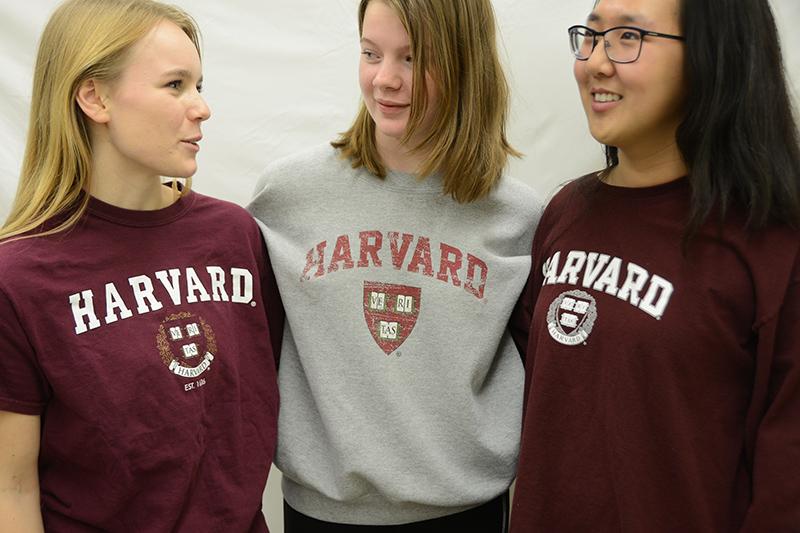Oct. 15, a trial based on a 2014 lawsuit filed by the private organization Students for Fair Admissions (SFFA) against Harvard took place at the United States District Court in Boston, overseen by Judge Allison D. Burroughs.
In the lawsuit, SFFA alleges Harvard’s admission processes are discriminatory towards Asian Americans and violate Title VI of the Civil Rights Act of 1964.
While the use of race-conscious admissions has been upheld by the Supreme Court in several cases, including the recent Fisher v. Texas, under the new administration, this could change.
Legal strategist Edward Blum, a conservative, long-time opponent of affirmative actions is leading the charge as the head of SFFA. A self-described former liberal, Blum aims to permanently end race-conscious admissions in American universities.
Junior Leela Cullity-Younger, who is one-quarter Indian and three-quarters Caucasian, said her parents have warned her of the discrimination she might face due to the color of her skin. Although Culitty-Younger often lists Caucasian as her race, in person she is not white-passing and worries this may be a disadvantage for her in the future.
“My sister portrays more white characteristics than me, and [my parents] said that if she goes into an interview there’s a chance that she could get in better than me,” Culitty-Younger said. “That’s always something that I consider and it sucks because when a person is Asian they really have no control over that.”
One major piece of supporting evidence for SFFA’s case is part of Harvard’s holistic application process. In a review of 160,000 applications, a statistical analysis found Asian American students were consistently ranked lower in soft skills such as “likability, integrity, helpfulness and courage.” Many see these subjective measures as unfair and a way of discriminating against qualified applicants.
Sophomore William Yoo said from a young age his parents have taught him that there are higher expectations for Asian Americans. While he can see the rationale behind race-based admissions to an extent, he doesn’t agree with the amount of stock put in personality traits.
“I don’t see why they would put so much weight on something like likability,” Yoo said. “You go to a college… to learn. I don’t think how other people perceive you should impact the quality of your education.”
Harvard toes a fine legal line in its use of race-based admissions. While this practice was legitimized by a legal precedent set in the 1970s, race-based quotas were deemed unconstitutional. In addition, in 2013 the Supreme Court ruled that colleges must use “available, workable, race-neutral alternatives” before race as admissions criteria.
Meanwhile, Harvard has received much support in its use of race-conscious admissions. In July of 2018, more than 70 amicus briefs were filed, many by Asian American groups. Amicus briefs are legal documents, usually authored by parties not involved in the case, in support of one side that can be taken into consideration by the court. The National Association for the Advancement of Colored Peoples Legal Defense Fund, the Harvard Asian American Alumni Alliance and the American Civil Liberties Union are just a few of the notable groups backing Harvard’s admissions practices. To date, there are more than 500 amicus briefs supporting Harvard.
Asian Americans, the group that the lawsuit would allegedly benefit, are fighting back against the narrative of affirmative action being a penalty for Asians. In reality, 73 percent of Asians support affirmative actions. In a Vox article, Asian American writer Alvin Chang said, “The idea that affirmative action doles out bonuses and penalties obscures the far more complicated reality of how the policy actually works. [This notion] suggests that if we went purely by [the] idea of merit, it is white and Asian people who would be on top, and that that is the natural state of the world.”
Others, such as RBHS’ gifted education teacher, Gwen Struchtemeyer, who frequently helps students with college applications, argues ending affirmative action is not the answer to making college admissions more fair. Rather it is a discontinuation of acceptances based on legacy status and large donations made by parents.
In addition, while standardized test scores may seem like an objective way of judging student’s merit, they actually favor wealthier students who, among other factors, have the ability to take costly tests multiple times and to pay for tutoring.
While past Supreme Court cases and administrations have shown consistent support for affirmative action, the Trump administration has shown support for Blum’s case. With the Oct. 15 court date, the future of affirmative action remains in question.
“Regardless of race, I think the primary thing that should be considered is grades and… extracurriculars,” Culitty-Younger said. “Then, if there is a [lack of diversity, race] can be considered.”
Categories:
Harvard lawsuit may change the future of affirmative action
October 19, 2018
Seniors Megan Pullen, Laura Scoville and Emily Ma discuss the controversy over Harvard admissions. The three have been friends through high school and prepare dread leaving each other for college next year. Photo illustration by Allie Pigg
2
0
Tags:
More to Discover














































































Snowy • Oct 23, 2018 at 11:16 am
Very interesting! I wonder what Asian American students will think of the outcome whether the action is affirmative or not.
Karina • Oct 19, 2018 at 3:15 pm
This was an interesting article. I saw the news about the lawsuit on NBC News and I wonder how this could impact my future college opportunities since I myself am Asian.